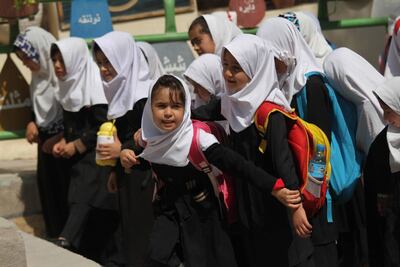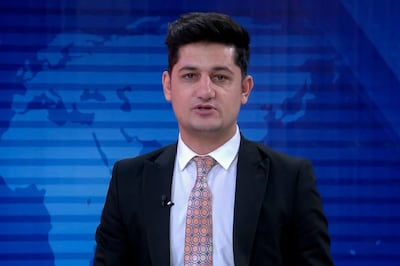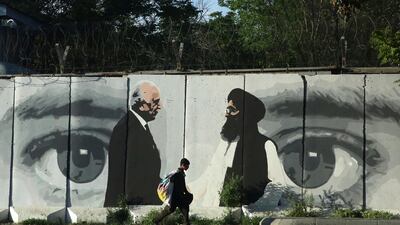Many Afghans predict that the Taliban will return to formal power in Afghanistan, either through a peace settlement or a bloody military takeover once foreign troops are gone. But it remains a mystery to what extent the Islamist militant group has moderated its extremist beliefs and is willing to embrace major change.
During its brutal rule from 1996 to 2001, the Taliban established a fundamentalist regime that oppressed women, massacred religious and ethnic minorities and banned free speech. It has adopted a more conciliatory public image in recent years, claiming that it is not seeking a monopoly on power, nor does it want to re-establish its rule of the 1990s, which even it now describes as “harsh”.
But the Taliban’s desire to establish a “truly Islamic” system in Afghanistan remains vague on many issues, including women’s rights, freedom of expression and the country’s future political structure. The group’s former regime was a theocracy, in which power was centralised in the hands of a so-called "Commander of the Faithful”. This supreme leader was the head of state and had ultimate authority. The regime’s governance was based on what it claimed was a strict interpretation of Sharia.
“Apart from a few statements, the Taliban has barely revealed its positions or plans on important issues,” Rahmatullah Amiri, an Afghan researcher who studies the Taliban, has told me.
The Taliban’s ambiguity on key issues could be down to strategy or reflect divisions within the group. Many Afghans have interpreted their ambivalence as proof that the militants intend to roll back democratic gains made in Afghanistan since they were toppled from power in 2001. Experts say the best way to gauge future Taliban behaviour is by looking at how the militant group administers areas under its command in Afghanistan, where it controls or contests around half of the country.
My colleagues and I spent several days this year interviewing Afghans who live in areas currently under Taliban rule. Many of them told us that the group continues to preserve its radical ideology and many of its draconian laws. They recounted to us the ways in which the Taliban has not changed.
The Kabul administration controls all provincial capitals and major cities while the Taliban commands swaths of the countryside. Written permission from the Taliban is needed to visit areas under their control. But the militants restrict where reporters go and to whom they speak. They are often at pains to show Taliban rule in a positive light.
My colleagues in the field had to meet many of the interviewees at bus stops in government-held areas as they were returning to their villages in Taliban territory. Some agreed to speak on the phone. They all spoke on the condition of anonymity, out of fear of retribution from the Taliban. Even then, the fear was palpable in their voices.
When the Taliban first ruled Afghanistan, it banned TV and music, forced men to pray and grow beards, compelled women to cover themselves from head to toe and prevented most women and girls from working or going to school. It amputated the hands of thieves, publicly flogged people for drinking alcohol, and stoned to death those who engaged in adultery. Executions were common.
Little of that has changed. Today, locals say public executions and floggings are still common in Taliban-controlled areas. Women remain largely confined to their homes, many girls are still denied schooling and free speech remains a punishable offence.

Afghans living under the Taliban’s thumb describe an intensely religious group that still rules by fear and intimidation and crushes dissent.
Women are still largely banned from working outside the home, locals say. In some areas, there are exceptions for those working as teachers, doctors or nurses. Even then, male and female patients have to be segregated and female medical staff must comply with strict dress codes. All women must still be accompanied by a male relative when they leave their homes.
The Taliban continues to curtail girls’ education severely. In some districts under its control, there is not a single school for girls. In other districts, the Taliban restricts education to prepubescent girls.
Ironically, the government or foreign organisations pay the salaries of teachers at schools in Taliban-controlled areas. Even then, the Taliban sets the curriculum. Often, subjects such as science and English are replaced by Islamic studies.
In some areas where there are no girls’ schools, locals, on rare occasions, have successfully lobbied for the militants to permit education.
But brutal public punishments are also still commonplace in Taliban-held areas. The group’s courts continue to use draconian interpretations of Sharia, relying on punishments such as stoning. Thieves often have their faces blackened and are paraded in public before they are beaten. In many Taliban-controlled areas, men or women found guilty of having a relationship outside of marriage or an extramarital affair are publicly lashed or executed.

The Taliban also suppresses free speech in areas under its rule. Smart phones and social media are banned to prevent access to independent information. Some Afghans have said they were beaten by the Taliban for posting critical comments on Facebook. Members of civil society groups in Taliban areas have been intimidated and detained.
The Taliban has also killed dozens of journalists and targeted independent media outlets that report critically about them. Eleven journalists and media workers have been murdered this year alone, with many of the killings blamed on the Taliban. On May 5, the Taliban accused independent media outlets of "one-sided propaganda" and threatened journalists with “consequences”.
Four of my colleagues have been killed in recent years in attacks attributed to the Taliban. Threats and intimidation by militants have forced other colleagues to quit their jobs or seek safety abroad. During reporting assignments in Kabul, my own movements are restricted. I often change my routes to and from the office, use different means of transport and try to avoid peak traffic, when suicide bombers often strike to inflict maximum casualties. For visitors, the dread of bombings in the overpopulated city is often overwhelming. Many Afghans, though, have become numb to the threat of danger after more than 40 years of grinding war.
The killing of reporters has forced local media outlets to adopt new security measures and self-censor over fears their stories could have security implications. Some employers have even offered journalists weapons to protect themselves. A growing number of them, especially women, are quitting their jobs or fleeing abroad.

But while the Taliban’s red lines on its notion of religion and morality appear to be intact, the group has changed in other ways. It has toned down at least some of its repressive laws. Afghans living under Taliban rule say listening to music or watching television is tolerated in some areas. Rules on the length of one’s beard have been relaxed in some areas.
“They are more diplomatically engaged,” Ibraheem Bahiss, an independent Afghan researcher, has told me. “They are also technologically savvier, utilising new tools to amplify their message and undermine that of their rivals.”
The Taliban’s governance has also become more decentralised and ad hoc, says Mr Bahiss. It has even expanded its co-operation with foreign aid groups, allowing them to provide health care and educational services to areas under its command.
The Taliban’s religious teachings and promotion of tribal codes local to their rural heartland have struck a chord with some currently living under the group’s thumb in the countryside, which has borne the brunt of the war and where life has improved little since 2001. But those ideas are largely alien in Afghanistan’s major urban centres, which have witnessed major social, economic and democratic gains over the past 20 years.
As Mr Amiri puts it: “The Taliban has changed compared to pre-2001, but whether these changes go far enough for the international community and the Afghan population, in particular for women, minorities, and the educated, is the question.”
Frud Bezhan is a correspondent covering Afghanistan for Radio Free Europe/Radio Liberty


